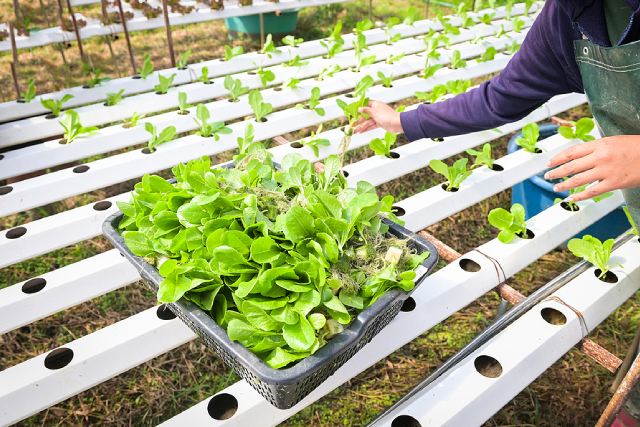
25 Sep Hydroponic Gardening: Is It Truly An Eco-Friendly Choice?
Hydroponic gardening has been gaining popularity as a revolutionary way to grow plants without soil. This method is often lauded for its efficiency, resourcefulness, and, most importantly, its eco-friendly nature. But how sustainable is it, really? With more people in Singapore turning to hydroponics as a solution for urban gardening, it’s worth taking a closer look at the environmental impact of this practice. Does it live up to the green reputation it has earned, or are there hidden factors that we should consider?
Before diving into the details, let’s clarify what hydroponic gardening involves. Essentially, it’s a method of growing plants using nutrient-rich water instead of soil. The plants are typically supported by inert mediums like perlite, rock wool, or clay pellets and are fed a precisely balanced mix of nutrients directly through the water. The controlled environment of a hydroponic system in Singapore allows for year-round growing and faster plant production, which sounds ideal for anyone looking to maximise their garden’s output. But the question remains: does this approach truly benefit the environment as much as we think?
The benefits of hydroponic gardening
1. Water efficiency
Among the most significant advantages of hydroponic gardening is its water efficiency. In the debate of traditional farming vs hydroponics, traditional soil-based farming often leads to water wastage due to runoff and evaporation. In contrast, hydroponic systems are designed to recirculate water, meaning the same water is reused multiple times. This is particularly beneficial in water-scarce regions, where conserving water is crucial. In fact, some hydroponic systems use up to 90% less water than traditional farming methods, making them a sustainable choice in areas where water conservation is a priority.
2. Space utilisation
Urban areas – like Singapore, where space is at a premium – benefit greatly from hydroponic gardening. These systems can be set up vertically, allowing for a higher density of plants in a smaller area. By reducing the need for large plots of land, hydroponics also minimises the disruption of natural ecosystems that often occurs with traditional agriculture.
3. Pesticide reduction
Because hydroponic gardening is typically done in a controlled environment, the need for pesticides and herbicides is greatly reduced. Without the threat of soil-borne diseases or weeds, plants can thrive without the addition of harmful chemicals. This reduction in pesticide use not only leads to healthier produce but also decreases the chemical runoff into our water systems, contributing to a cleaner environment.
The potential drawbacks of hydroponic gardening
1. Energy consumption
While hydroponic gardening offers many benefits, it’s not without its downsides. One of the most significant concerns is energy consumption. Many hydroponic systems require artificial lighting, heating, and cooling to maintain the optimal environment for plant growth. This is particularly true for large-scale operations that aim to produce food year-round. The reliance on electricity can negate some of the environmental benefits, especially if the energy used comes from non-renewable sources. In Singapore, where energy costs are high, this can also become a financial burden for home gardeners and commercial growers alike.
2. Nutrient runoff
Another issue to consider is nutrient runoff. In a hydroponic system, plants rely on a precise mixture of nutrients added to the water. If the system isn’t managed correctly, excess nutrients can be released into the environment, leading to pollution of nearby water bodies. This nutrient pollution can cause algal blooms, which can harm aquatic life and degrade water quality. Although this risk can be mitigated with proper system management, it’s a factor that needs careful attention.
3. Material use and waste
The materials used in hydroponic systems also raise environmental concerns. Many systems rely on plastic components such as trays, pipes, and containers, which, if not sourced responsibly, can contribute to plastic waste. Additionally, the inert growing mediums, such as rock wool or perlite, are not always biodegradable, leading to disposal challenges. While some companies are beginning to offer more sustainable materials, the majority of systems still depend on materials that may not be environmentally friendly in the long term.
Is hydroponic gardening truly eco-friendly?
The answer to whether hydroponic gardening is genuinely eco-friendly isn’t straightforward. On one hand, it offers remarkable benefits in terms of water conservation, space efficiency, and reduced pesticide use. For urban areas like Singapore, where traditional farming isn’t feasible, hydroponics provides a viable alternative for growing fresh produce locally, reducing the carbon footprint associated with transporting food.
However, the potential environmental costs, particularly related to energy use and material waste, cannot be ignored. The key to making hydroponic gardening truly eco-friendly lies in addressing these challenges. Using renewable energy sources, such as solar power, to run hydroponic systems can significantly reduce their environmental impact. Additionally, investing in biodegradable or recyclable materials for system components can help mitigate waste concerns.
Conclusion
Hydroponic gardening is a promising solution for sustainable agriculture, especially in urban settings where traditional farming is not an option. It offers numerous environmental benefits, from water conservation to reduced pesticide use. However, it’s essential to be aware of the potential drawbacks, such as energy consumption and material waste, to ensure that this method of gardening lives up to its eco-friendly reputation.
For those considering setting up a hydroponic system in Singapore, it’s crucial to carefully manage these systems to minimise their environmental impact. Vicplas offers a comprehensive range of quality trays, gutters, and channels that are sustainable and safe for agricultural use, helping you create a greener, more sustainable gardening setup.
